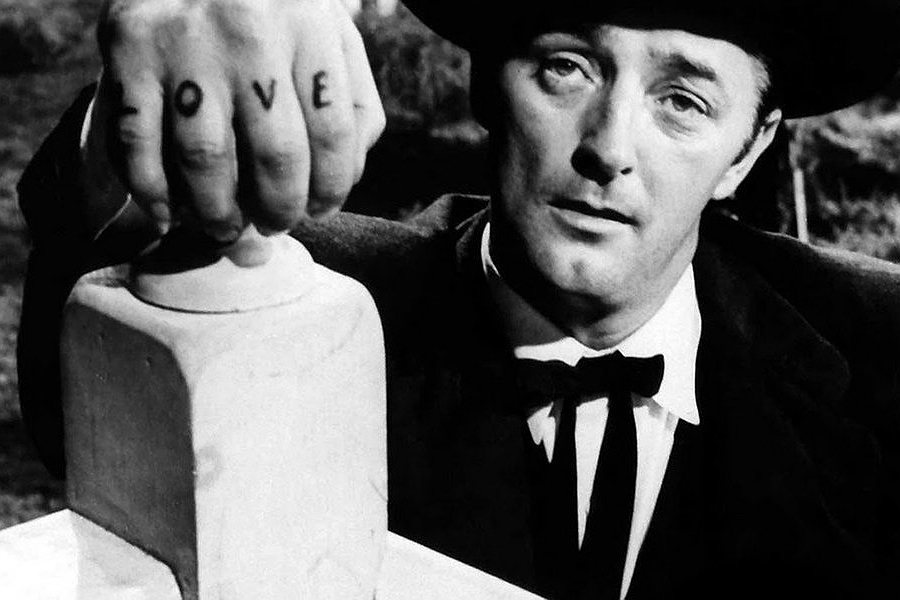The Night of the Hunter – Previewed

Adam Scovell on The Night of the Hunter, a directorial debut of rare quality…
There are certain curios in cinema; films that are one offs, unique, which leave a desire for more. Charles Laughton’s The Night of the Hunter (1955) is just that, though not because its narrative world is one which requires another visit. Instead the sad fact that this beautiful, complex piece of art is a one off, a perfect directorial debut – discounting his helping hand on The Man in the Eiffel Tower (1949) – and finale. Much has been waxed about Welles’ debut (Citizen Kane) being astonishing due to the director’s age, and this seems to be the only factor that distracts from The Night of the Hunter being considered the best directorial debut in Western film.
Often cited as a film noir, it seems more sophisticated than the genre pigeon-holing provided it. There are of course elements to the film that are filled with the tense, crime infused pulp that makes noir so appealing, but Laughton’s film is unique in its presentation. Among the elements that make it so special, the story has the deliberate feel of a fairy tale. Dark mixes light and produces a product not unlike a modern take on Grimm.
Robert Mitchum plays Harry Powell, a crazed religious conman who marries widows for their money, akin to Joseph Cotten’s Uncle Charlie in Shadow of a Doubt (1943). This particular episode in Powell’s life sees him marry a gullible widow after finding out from her husband in jail that somewhere on their property is stashed $10,000. What Powell fails to realise is that the money’s whereabouts is known to his two step-children, John (Billy Chapin) and Pearl (Sally Jane Bruce), who go to desperate lengths to hide the money from him.
As with many fairy tales, this contains a strong parable element. The main aspect to come through from the narrative is the death of childhood through the loss of one’s parents. John is increasingly forced to become a father figure to his sister, taking charge of the household when his mother is too overwhelmed to do anything about Powell’s increasingly obvious evil intentions. John’s journey is finally completed on Christmas day, with the gift of a watch he’d been eyeing in a shop window. He’s lost much at the hands of both his father and Powell, but his journey to manhood has been jump-started, at least mentally, and this is highlighted as being a silver lining to his very dark cloud indeed.
With a story that jolts between macabre, American weirdness, magic and realism, it’s perhaps unsurprising that the film is visually stunning. Its opening and closing shots bring to mind Capra’s It’s a Wonderful Life (1946), with its fireside telling of a moral-infused story at Christmas. This sets up a wonderful precedent for visual experimentation and sometimes even extravagance: the body of a character (who will remain nameless for spoiler reasons) is found in a car submerged underwater. There is a Tarkovsky-like elegance to the scene; the character’s long hair eerily floating like a ghost in the lake who is only spotted by a fisherman.
The strongest parts of the film revolve around the main chase sequence, when Powell finally tries to force John to give up where the money is. This sequence is filled with expressionistic shots, including of a spider’s web and a toad, all shot under a sparkling star-filled night. Its blend of fantasy and noir is what makes the film such a one off.
The quality of every aspect of the film is also quite astonishing; Lillian Gish and Robert Mitchum are perfectly cast as hero and villain. Mitchum in particular is the ultimate bogeyman, as terrifying as anything produced in horror from the era. With love and hate tattooed on his hands and a habit of singing “Leaning on the Everlasting Arms”, he’s a horrific creation that’s just about repellent enough to enjoy while being appalled at his sheer insanity at the same time.
So with a gripping, layered narrative of dark and light, noir aesthetics and elements of a fairy tale world, The Night of the Hunter is almost unique. With warm notes as well as cool, it’s actually a great film for Christmas viewing and a highly original choice for the time of year, leaving the perennial White Christmas for dead.
Adam Scovell
Night of the Hunter screens Saturday 8th December (new date!) 6pm @ the Bombed Out Church
Donation minimum is £2





